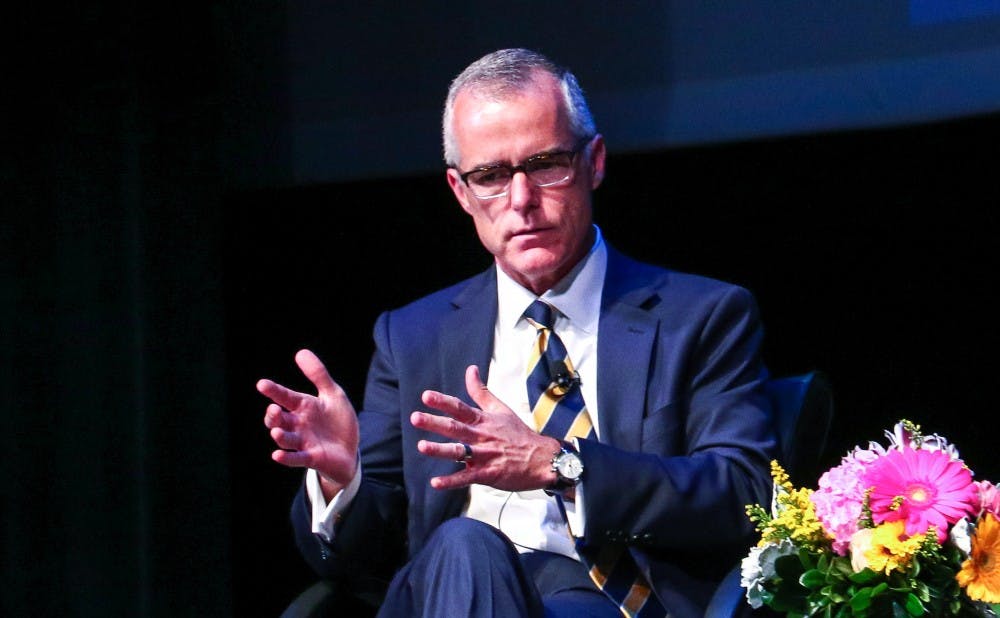Andrew McCabe, former FBI Deputy Director and Trinity ’90, said that President Donald Trump has shattered norms in a way that has damaged American democracy at a talk on campus Tuesday.
McCabe, who served as the acting director of the FBI from May 2017 to August 2017 following Trump’s firing of James Comey, discussed his experiences working under Trump in the FBI, among other topics. McCabe was deputy director of the FBI until January 2018, when he stepped down but stayed on payroll. Then-Attorney General Jeff Sessions fired McCabe two months later—just two days before he would have been eligible to receive pension.
After Comey's dismissal in May 2017, McCabe and the FBI were embroiled in what he called a “toxic environment,” under siege by Trump, who accused him of bias.
Trump reportedly questioned some donations that McCabe's wife, Jill, received during a failed Virginia state senate run. During her 2015 campaign, Jill McCabe received close to $470,000 from a political action committee controlled by former Virginia Gov. Terry McAuliffe, who is closely tied to former presidential candidate Hillary Clinton's family. In a 2017 tweet, Trump laid into Sessions for not replacing McCabe.
McCabe said he believed Trump's siege on the FBI undermined American democracy and fundamental values.
“Norms have been shattered one after another, in ways that I think are deeply damaging to our democracy,” he said. “The thing that troubles me the most is that… this president doesn’t either understand or respect our democracy in the way that we understand it. To considerably hold himself above the law cuts against the absolute tenet of our society.”
At the talk, entitled “The Threat: How the FBI Protects America in the Age of Terrorism and Trump” after his recently-published book of the same name and hosted by American Grand Strategy, McCabe recounted the FBI's investigation into Russian interference in the 2016 presidential election. He strongly defended the integrity and validity of the bureau’s work and conclusions.
Even though Attorney General William Barr says Robert Mueller's special counsel investigation was unable to establish evidence for collusion and did not determine obstruction of justice, McCabe mentioned, it doesn't mean that the investigation was unnecessary.
“We don’t start investigations driving at a conclusion. We don’t consider investigations to be a waste of time or unwarranted simply because they end up in ways we didn’t expect they’d end up,” he said. “We start investigations because you have an obligation to do your job. And our job at that moment, when we had that articulable suspicion, was to conduct the investigation to ensure that we, the Justice Department, and the world, would know if in fact that threat existed. And it’s just as valuable to say no, it didn’t.”
McCabe also discussed the FBI’s investigation of Hillary Clinton's emails, which began July 2015 when the bureau received a referral alleging that Clinton had transmitted classified material on a private email server rather than her State Department server.
McCabe explained that the FBI’s responsibility was to decide if the classified material was mishandled, and more importantly, if the mishandling was done intentionally. Without clear evidence of intent, he said, the FBI couldn't sustain a criminal charge.
He became involved in February 2016 towards the end of the investigation, when he conducted critical interviews with people involved in attempts to find evidence for intent. At the end, they were unable to find evidence that Clinton or anyone around her had intended to transfer classified information.
However, the bureau drew criticism after Comey announced the decision to the public himself July 5, 2016. Rather than allowing the Justice Department to announce the results as per normal procedure, Comey, McCabe and the rest of the bureau decided the Department of Justice didn't have enough credibility on the issue and that the FBI should step up to the task instead.
"With hindsight, I think we made a mistake,” McCabe said. “I think we were overconfident in Director Comey's ability to communicate to convince people of the good work that we had done and the validity of our conclusions. I think we underestimated the toxicity, the divide in that environment... and the fact that people would see our conclusions through the lens of their own personal politics no matter what we said. So, I think we in some ways took on far too much risk for the organization and should have approached that decision in a different way."
But the only thing McCabe would have done differently was how they announced their results, he said. McCabe dismissed critics accusing the FBI of partisan bias favoring Clinton. He said that the facts were the facts—the evidence to prove intent was simply not there, and he still has the utmost confidence today that the FBI reached the right conclusion.
Even amid the chaotic atmosphere he described, McCabe said that he remains optimistic that America and the FBI will emerge from the present period intact and even stronger. He said that both the nation and the FBI had been through some terrible times in the past—times that have challenged the sacred trust that Americans hold to protect them from harm and uphold the Constitution. But despite everything, the United States emerged better for it, he said.
Get The Chronicle straight to your inbox
Sign up for our weekly newsletter. Cancel at any time.

Mona Tong is a Trinity senior and director of diversity, equity and inclusion analytics for The Chronicle's 117th volume. She was previously news editor for Volume 116.

